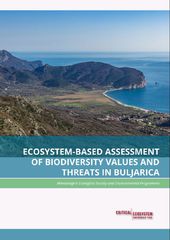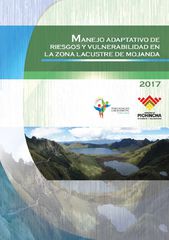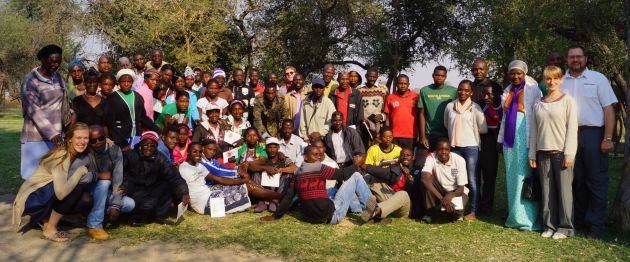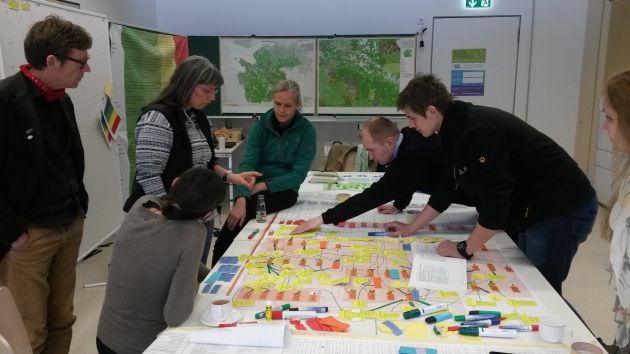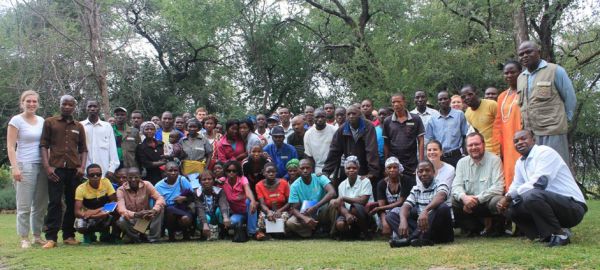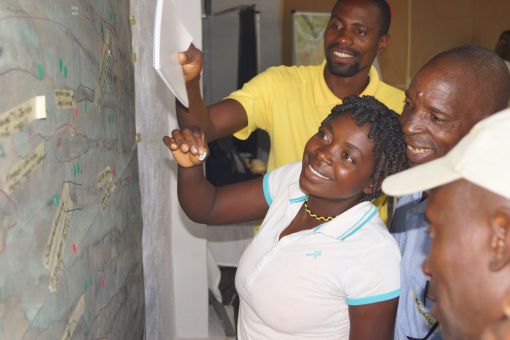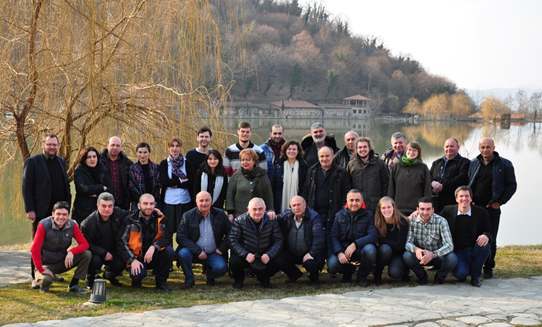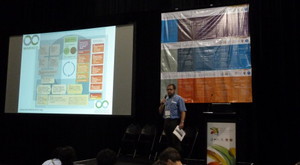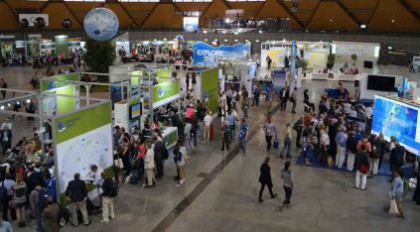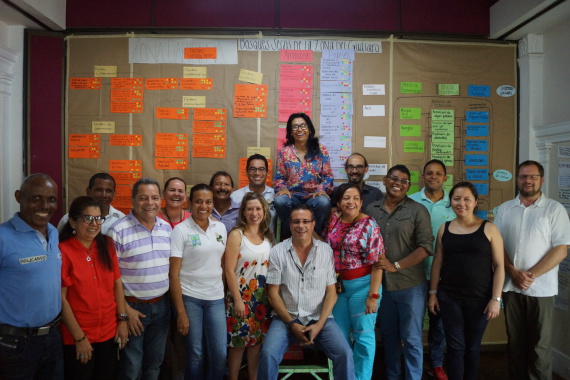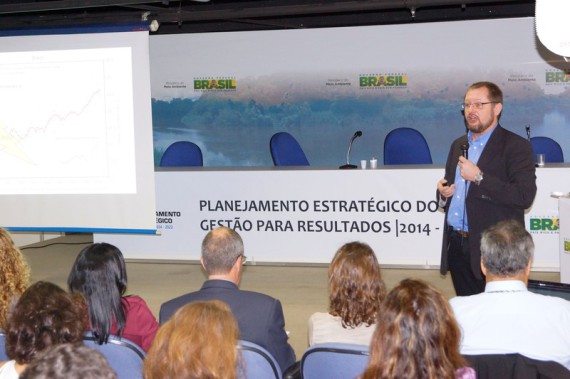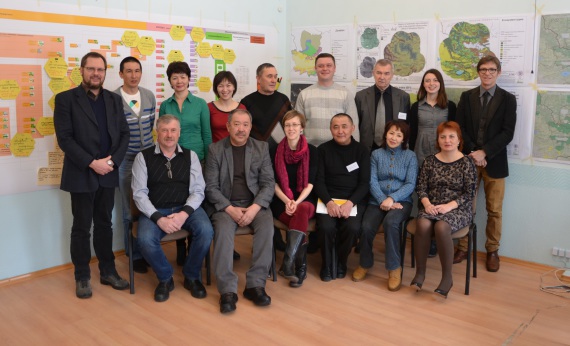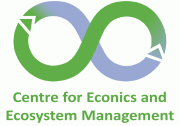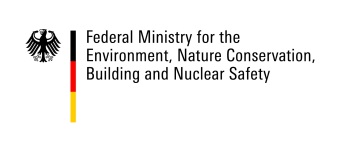News
+++ July 2020. Activities of the “Ecosystem-based adaptation (EbA) to climate change (CC) and regional sustainable development by empowerment of Ukrainian Biosphere Reserves” project, implemented by the Michael Succow Foundation, in cooperation with the Centre for Econics and Ecosystem Management and the Ministry of Ecology and Natural Resources of Ukraine continued in form of online workshops, due to the Covid-19 pandemic. During these workshops, the management teams of the Desna, Roztochya and Shatskyi Biosphere Reserves continued to work on ecosystem-based solutions to counter the negative effects of global climate change. For further information check out the project webpage.+++
+++ December 2019. Between 1th – 4th December 2019, Axel Schick conducted a MARISCO workshop in Kaluža, Slovakia in the context of a consultancy for the INTERREG BEECH POWER project of the European Union. The workshop was attended by project teams from Slovakia, Slovenia and Germany, local stakeholders represented by state and private foresters as well as protected area management teams of the Slovak component parts of the UNESCO World Heritage Site ‘Ancient and Primeval Beech Forests of the Carpathians and Other Regions of Europe’– Poloniny National Park and Vihorlat Protected Landscape Area. For further information check out the project webpage.+++
+++ November 2019. End of November, Axel Schick conducted a MARISCO workshop in Ljubljana, Slovenia in the context of a consultancy for the INTERREG BEECH POWER project of the European Union. The workshop was attended by project teams from Slovenia, Slovakia and Germany, local stakeholders represented by state as well as protected area management teams of the Slovenian component parts of the UNESCO World Heritage Site ‘Ancient and Primeval Beech Forests of the Carpathians and Other Regions of Europe’– Snežnik and Krokar. For further information check out the project webpage.+++
+++ September 2019. A new project of the Centre for Econics has started that is tasked with the ‘Development and testing of a participatory-adaptive methodology (based on the MARISCO-methodology) for ecosystem-based risk management of groundwater and surface waters’. In the context of this project the MARISCO method will be updated and a web-based software will be developed. For more information check out the MARISCO 2.0 + Software section on this homepage.+++
+++ May 2019 In the context of the “Ecosystem-based adaptation (EbA) to climate change (CC) and regional sustainable development by empowerment of Ukrainian Biosphere Reserves” project, implemented by the Michael Succow Foundation, in cooperation with the Centre for Econics and Ecosystem Management and the Ministry of Ecology and Natural Resources of Ukraine, MARISCO workshops were conducted for the Desna, Roztochya and Shatskyi Biosphere Reserves, in order to promote ecosystem-based adaptation to climate change. The project is funded by the German Federal Ministry for the Environment, Nature Conservation and Nuclear Safety (BMU) and is part of the International Climate Initiative (IKI). For further information check out the project webpage.+++
+++ May 2019. A classification of key ecological attributes and stresses was published that facilitates the description of the functionality and impairment of biodiversity targets. The publication is entitled: Classification of key ecological attributes and stresses of biodiversity for ecosystem-based conservation assessments and management was published (or journal webpage: Ecological Complexity)+++
+++ February 2019. The MARISCO method has been applied to the adaptive management of diverse protected areas in Ecuador, in the context of the program “Increasing resilience to climate change through the protection and sustainable use of fragile ecosystems” (ProCamBío II). This program has been implemented by the Deutsche Gesellschaft für Internationale Zusammenarbeit (GIZ) in cooperation with the Ecuadorian Ministry of Environment (MAE), commissioned by the German Federal Ministry for Economic Cooperation and Development (BMZ). During this process, the Polytechnic High School of Chimborazo (ESPOCH), the University Amazon Regional Ikiam, the Pontifical University of the Catholic Church of Ecuador - Esmeraldas Headquarters (PUCESE), the National University of Loja (UNL) and the Private Technical University of Loja (UTPL) contributed to strengthen the integrated management of the fragile ecosystems of the Fauna Production Reserve Chimborazo, the Mangrove Wildlife Refuge Muisne River Estuary, Colonso Biological Reserve Chalupas, the Golden Heart Protected Forest and the coastal ecosystems of El Oro province. +++
PDF-Dokument [3.7 MB]
PDF-Dokument [5.1 MB]
PDF-Dokument [12.2 MB]
PDF-Dokument [3.4 MB]
PDF-Dokument [7.6 MB]
+++ October 2018. The next stop of the consultancy for the “Biodiversity and ecosystem services in agrarian landscapes” project took the two members of the Centre for Econics and Ecosystem Management to the state of Mizoram in northeast India, where they analyzed the local rotational agroforestry systems (jhum) together with representatives of 3 villages in the Mamit district. As in Tajikistan, the findings will form the basis for the development of biodiversity and ecosystem service indicators +++
+++ August 2018. Another peer-reviewed academic article on MARISCO entitled: People-Centered and Ecosystem-Based Knowledge Co-Production to Promote Proactive Biodiversity Conservation and Sustainable Development in Namibia was published (or Journal webpage: Environmental Management) +++
+++ May 2018. Two representatives of the Centre for Econics and Ecosystem Management travelled to Tajikistan to conduct participatory workshops in the context of a consultancy for the “Biodiversity and ecosystem services in agrarian landscapes” project that CEEM is implementing in cooperation with the Leibniz Centre for Agricultural Landscape Research (ZALF). Together with local farmers, institutions and scientists, they analyzed the risks and vulnerabilities of five watershed belonging to the Ayni and Rasht areas in the Zerofshan Valley using the MARISCO method, as basis for the development of indicators to assess the impact of the project on biodiversity and ecosystem services +++
+++ May 2018. Between the 4th and 7th of May, Ulrike Gollmick and Stefan Kreft conducted a “Fabulous MARISCO Workshop” as opening event of the Floating University Berlin. The FUB is a temporary infrastructure built into a rainwater retention basin. The FUB is dedicated to developing visions of new urban practice. The MARISCO workshop started with a field trip, in order to familiarize the participants with the complex of green spaces and densely populated areas around the basin. During the following 3-day workshop, the overall 20 participants analyzed the social and ecological systems of the project area and the services that they provide, as well as the stresses, threats and contributing factors that lead to their degradation. Towards the end, during a half-day open forum, both invited representatives of institutions in the neighbourhood and the casual visitor were given the opportunity to inspect the resulting conceptual model of the socio-ecological context and make additions to it. The conceptual model was displayed another two weeks at the reception of the FUB campus. – (http://www.floatinguniversity.org/fabulous-marisco-workshop/)
During an event on the 17th of May organised by the Technische Universität Berlin at the FUB, Stefan Kreft was invited to present the outcomes of the MARISCO workshop to a wider public (http://habitat-unit.de/en/events/urban-talk-21-urban-systems/) +++
+++ October 2017. The Montenegrin Ecologists Society and Environmental Programme conducted an ECOSYSTEM-BASED ASSESSMENT OF BIODIVERSITY VALUES AND THREATS IN BULJARICA using the MARISCO approach for highlighting the need to protect a rare ecosystem on the Adriatic coast in Montenegro +++
PDF-Dokument [15.1 MB]
+++ August 2017. The MARISCO method has been applied to the adaptive management of a lakescape and paramos in the area of Mojanda, Municipio de Pedro Moncayo, Province of Pichincha, Ecuador. A diagnostics and strategy document was prepared and published by the municipal government +++
Documento técnico_Mojanda_2017.pdf
PDF-Dokument [20.3 MB]
+++ 14 June 2017. At the 29th session of the Man and the Biosphere Programme International Co-ordinating Council (MAB-ICC) in Paris, the Great Altay Transboundary Biosphere Reserve has been accepted (together with 22 other new sites). The decision followed the recommendation of the Advisory Committee " The Advisory Committee welcomed this joint transboundary proposal from the Russian Federation and the Republic of Kazakhstan, composed with the Katunskiy Biosphere Reserve (Russian Federation designated in 2000) and the Katon-Karagay Biosphere Reserve (Republic of Kazakhstan designated in 2014)". The Advisory Committee also "commended the three-year participatory planning process (ecosystem-based, adaptive and participatory management approach) that led to the joint nomination form and acknowledged the long-term technical cooperation with several initiatives and activities to promote and foster transboundary nature conservation in the Altai region". The Centre coordinated the elaboration of the nomination dossier, the management plan, and the corresponding joint efforts with the partners from Russia and Kazakhstan applying MARISCO +++
+++ April 2017. First peer-reviewed academic article on MARISCO: Conservation and sustainable development in a VUCA world: the need for a systemic and ecosystem-based approach (or Journal webpage: Ecosytem Health and sustainability) +++
+++ August 2016. A new MARISCO highlights how the method can be used for empowering local people. It refers to the Kalahari case in Namibia +++
+++ August 2016. The next MARISCO-mission sends a team of two representatives of the CEEM to Uzbekistan. In cooperation with the Michael-Succow-Foundation a first MARISCO-workshop is to be held at Urgench region. The focus of this first session will deal with adaptation measures to climate change in the area of Amudarya river, close to the Western Uzbek border to Turkmenistan. As this water body once used to connect the northern area of the Himalaya Mts. to the Aral Sea and this connection is no longer existing, the resulting social issues are obviously dealing with water- and food security. These problems are going to be identified, discussed, and analysed during the workshop-session +++
+++On the 14th June the Centre for Econics and Ecosystem Management had the opportunity to join the workshop on ecosystem-based adaptation to climate change initiated by the “Deutsche Gesellschaft für Internationale Zusammenarbeit” (GIZ). In the course of an open market-place the MARISCO-method was introduced to various GIZ-staff and cooperation partners who shared high interest in acquiring further information on the implementation of MARISCO-exercises. Also, a second Training of Trainers was perceived with great curiosity. Therefore, ideas and possibilities are being discussed at the moment +++
+++ The Programme “Implementing the Biodiversity Convention” implemented by GIZ on behalf of the German Federal Ministry for Economic Cooperation and Development (BMZ) has commissioned CEEM to implement a training course for future coaches of the MARISCO methodology. The course is scheduled from 21 to 27 February 2016 in Schorfheide Chorin Biosphere Reserve close to Berlin, Germany. It will be conducted in close collaboration with the administration of the Schorfheide Chorin Biosphere Reserve and the German Federal Agency for Nature Conservation (BfN) +++
+++ 16 September. At an international workshop in Öskemen / Ust Kamenogorsk, Kazakhstan, the Centre for Econics and Ecosystem Management delivers the final products of a project funded and accompanied by the German Federal Ministry for the Environment, Nature Conservation, Building and Nuclear Safety (BMUB), the German Federal Environmental Agency, and the German Federal Agency for Nature Conservation (BfN): a management plan and a nomination dossier for the proposed Great Altay Transboundary Biosphere Reserve comprising protected areas in Kazakhstan and the Russian Federation. The exposure to risks like climate change and the inherent vulnerability of the fragile region requires an ecosystem-based conservation approach, which was applied using MARISCO method during a 3-year participatory planning process that was initiated back in 2012. The management document is available as free download +++
+++ July 2015. Our second workshop in Rundu, Namibia, has been an extraordinary success. After three intensive and committed days of work of about 60 participants on different strategies to improve the two conservancies’ (Muduva Nyangana and George Mukoya) current state, revealing results have been achieved and ideas developed. On the basis of a variety of stresses and threats in the ecosystem as well as their underlying problems deriving from several backgrounds, identified in the first workshop in March 2015, comprehensive sets of strategies have been worked out this time. They concern an improvement of the effectiveness of the management and work of the two conservancies and community forests. Present issues are tackled at different points of entry on a number of levels: The local level, the level of the two conservancies (individual as well as interrelated), the level of external authorities, and the government. According to these results a framework on how to approach these strategies as well as their implementation will be suggested. We are looking forward to ongoing cooperation +++
+++ 27 May 2015. In celebration of the 'Week of the Mata Atlantica in Brasil' we have launched a page with MARISCO training presentations in Portuguese language. This has been achieved thanks to the support of the Brazilian Ministry of Environment and GIZ. The first application of MARISCO in Brazil was realised in April for a site in the Mata Atlantica region within the Mosaico Extremo Sul do Bahia +++
+++ 27-30 April. In the context of a project funded by WWF, a group of experts representing FSC International, FSC Russia, WWF Russia, WWF Germany, as well as the University of Archangelsk and a forestry company from Archangelsk, stayed in Eberswalde and participated in a project workshop organised by the Centre for Econics and Ecosystem Management. The workshop was about understanding the situation of the forest in Archangelsk region and evaluating the effectiveness of Russian FSC standard (Forest Stewardship Council) in addressing relevant threats to forest ecosystems. The evaluation methodology is based on MARISCO +++
+++ April 2015. A MARISCO workshop was hosted by the Universidade Estadual de Santa Cruz in Ilhéus, Bahia in Brazil. It was organised and sponsored by the Brazilian Ministry of Environment and German development cooperation (GIZ). The scope was the Veracel reserve (RPPN Estação Veracel) and its surroundings in southern Bahia. Participants were scientists, protected area managers, and government representatives +++
+++ March 2015. MARISCO has been to Africa! A team of the Centre for Econics conducted two parallel workshops with two groups of people representing George Mukoya- and Muduva Nyangana Conservancies in the northern part of Namibia (Kavango region).
In these conservancies wildlife protection is a central challenge (the territory is divided into a settlement zone and a wildlife zone), and the management of the area lies in the hands of the local communities. Rising numbers of certain species (e.g. elephants) mirror the success of those projects. Still, due to overexplotation of natural resources and climate change, human wellbeing and ecosystem health are at risk. Ideally, the conservancies can make a difference and organize a more effective ecosystem management as well as an ecosystem-based adaptation to climate change. These challenges will be addressed in the context of the ongoing MARISCO exercise.
From the 24th to the 26th of March 2015 a wide average of people was participating in the situation analysis (farmers, traditional authorities, management committee members of the conservancies, national park managers, representatives of the Ministry of Environment and Tourism as well as Ministry of Agriculture, Water and Forestry etc.) which turned out to be extremely comprehensive and complete. The evaluation reflected the enthusiasm and motivation of the groups and will hopefully lead to a propelling second workshop in July 2015 +++
+++ December 2014 & January 2015. The latest fully completed MARISCO-application was conducted in the southern Caucasus region of Kakheti in Georgia. The participants analysed the vulnerability of their ecosystems and searched for more effective ways to more sustainably manage two regions stretching over a great part in the east of the country, more concrete Tusheti Protected Areas as well as the heavily agriculturally used Dedoplistskaro municipality. Under the outstanding and intensifying impacts of global climate change (esp. rising temperatures and decrease in precipitation) the ecosystems were discovered to additionally suffer from logging, intensive agriculture and pasture farming. Throughout a session to focusing on strategies, the existing strategies were identified to have a striking lack of governmental and institutional effort and developed complementary strategies accordingly (stronger integrated ecosystem management, institutional empowerment, joint coordinating body etc.).
Workshop one (systemic situation analysis) which took place in December 2014 resulted in a thorough overview and a sound understanding of a great number of elements evoking and influencing the (often poor) conditions of the ecosystems. Anthropogenic induced climate change played a major role in both models (especially an increase in temperature and decrease in precipitation) depicting the rising pressure not just on agriculturally used areas (causing droughts and a shortage of water especially in Dedoplistskaro municipality) but also on natural systems like forests of the mountainous zones. Also omnipresent herds of sheep have proven especially influential concerning the degradation of vegetation and soil in all territories.
After the second workshop in January 2015 existing strategies were identified and rated and amended by complementary strategies. Both groups recognized a lack of governmental and institutional effort and developed strategies and goals accordingly (stronger integrated ecosystem management, institutional empowerment, joint coordinating body etc.). Coincidentally the opportunity to present these results to the minister of environment occurred and was used to transmit the participants’ ideas and desires (representing a broad average of the people of Georgia) +++
+++ 15 November 2014. The MARISCO method – Adaptive Management of vulnerability and Risk at Conservation sites – has been presented at the World Parks Congress in Sydney, Australia. Together with representatives of WWF International, GIZ, and others, Pierre Ibisch participated in a session called “Tools Marketplace for Responding to Climate Change”, which was organized under the thematic stream “Responding to Climate Change”. It represented an opportunity to share a variety of tools and methods to respond to climate change, adaptation or mitigation. After individual presentations, the five speakers of the session participated in a World Café-type workshop discussing the presented methods.
The World Parks Congress is a global forum to identify and communicate solutions involving protected areas for the loss of biodiversity and environmental change. It is held once a decade, and the 2014 congress in Sydney, Australia, under the theme "Parks, people, planet: inspiring solutions", brings together up to 6,000 people from ca. 170 countries +++
+++ 18-28 September 2014. A Centre team visits Colombia, explores two areas in the Andes and the Caribbean region where the Colombian-German development programme PROMAC (Environmental Policy and Sustainable Management of Natural Resources) is implemented. In the city of Barranquilla, a MARISCO workshop with local, regional and national authorities and stakeholders facilitated a deeper understanding of the vulnerability of the study areas +++
+++ 17-27 March 2014. As consultant for GIZ Pierre Ibisch presents the MARISCO methodology and approach to projects, practitioners and decision makers in Brasil. A special emphasis was given to conservation mosaicos in the Mata Atlantica region. Presentations were delivered in the Ministry for Environment in Brasilia, Porto Seguro (Mosaico Extremo sul do Bahia), Antonina (Mosaico Lagamar), and in the Ministry of Environment of the Federal State of Paraná, Curitiba. A final event in Brasilia was opened by the Secretary of State for Biodiversity and Forests Roberto Brandão Cavalcanti, the coordinator for Research and Monitoring of ICMBio (Instituto Chico Mendes de Conservação da Biodiversidade), Katia Ribeiro, and Ingrid Prem, GIZ coordinator for the Tropical Forests Programme of the German development cooperation in Brazil +++
+++ 25-28 February 2014. Representatives for the adjacent protected areas Katon-Karagai National Park in Kazakhstan and Katunskiy Biosphere in Russia reaffirmed their willingness to cooperate closely and strive for the establishment of a large Transboundary Biosphere Reserve Altai. At a workshop in Ust-Kamenogorsk, East Kazakhstan, the participants acknowledged the considerable potential this would have in securing the conservation of biodiversity and sustainable development in the Altai Mountains.
The workshop was facilitated by the Centre for Econics and Ecosystem Management, Eberswalde, Germany, and carried out in the framework of the project “Development of a management plan for the projected Transboundary Biosphere Reserve (TBR) Altai”, sponsored by the German Federal Agency for Nature Conservation (BfN). Read more ... +++


